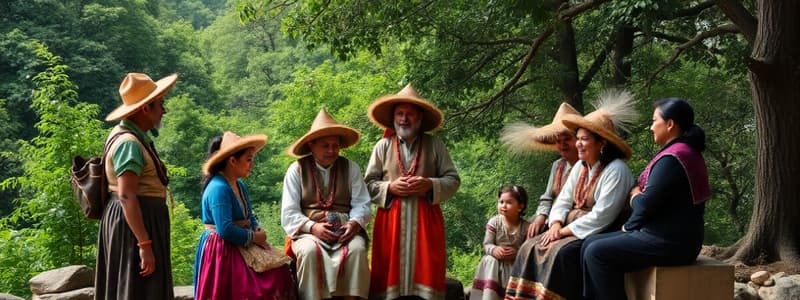Podcast
Questions and Answers
How do folklorists primarily contribute to communities regarding folklore?
How do folklorists primarily contribute to communities regarding folklore?
- By directly performing the folklore as part of their professional role.
- By focusing solely on theoretical analyses without practical application.
- By strictly prohibiting the growth of folklore to maintain its authenticity.
- By creating archives and museum exhibits to preserve and display information about local cultures. (correct)
What is the modern understanding of folklore, contrasting with earlier perspectives?
What is the modern understanding of folklore, contrasting with earlier perspectives?
- Folklore is a static entity, primarily found among the uneducated and poor.
- Folklore is a dynamic process that ebbs and flows with the times, lacking a fixed institutional anchor. (correct)
- Folklore is exclusively a positive reflection of community values, devoid of negativity.
- Folklore is best preserved by the elite and educated classes, who maintain its original form.
In folklore studies, how do folklorists approach the analysis of folklore?
In folklore studies, how do folklorists approach the analysis of folklore?
- By analyzing folklore as an isolated phenomenon, unrelated to anthropology or literary studies.
- By focusing exclusively on the written texts of narratives, disregarding cultural context.
- By examining both the folklore itself (the texts of narratives, objects, etc.) and the behavior surrounding it, similar to anthropology and literary studies. (correct)
- By ignoring the behavior surrounding folklore, concentrating solely on its literary merit.
Why is the setting in which folklore is performed significant to folklorists?
Why is the setting in which folklore is performed significant to folklorists?
What considerations about folklore lead to a deeper understanding?
What considerations about folklore lead to a deeper understanding?
According to Alan Dundes, what three aspects should be considered when collecting folklore?
According to Alan Dundes, what three aspects should be considered when collecting folklore?
What is the most common method that folklorists use to gather information?
What is the most common method that folklorists use to gather information?
How do folkloristic interviews differ from typical information-gathering interviews?
How do folkloristic interviews differ from typical information-gathering interviews?
How is fieldwork for folklore accomplished?
How is fieldwork for folklore accomplished?
What potential pitfall should folklorists be aware of when interviewing people they know well?
What potential pitfall should folklorists be aware of when interviewing people they know well?
Flashcards
Folklore Definition
Folklore Definition
The different kinds of folklore that crop up in different cultures and their social and psychological influences.
Folklorists
Folklorists
Individuals who study folklore, but do not necessarily perform it as part of their work.
Professional Folklorists
Professional Folklorists
Applying folkloric understanding in communities through archives, exhibits, or cultural mediation.
Two Main Types of Professional Folklore
Two Main Types of Professional Folklore
Signup and view all the flashcards
"Everyone is the folk"
"Everyone is the folk"
Signup and view all the flashcards
Folklorist analysis
Folklorist analysis
Signup and view all the flashcards
3 Parts of Folklore
3 Parts of Folklore
Signup and view all the flashcards
Text
Text
Signup and view all the flashcards
Context
Context
Signup and view all the flashcards
Texture
Texture
Signup and view all the flashcards
Study Notes
What Folklorists Study
- Folklorists examine various kinds of folklore across different cultures, focusing on the social and psychological influences involved
- A key aspect is how folklore is shared and its impact on communities.
What Folklorists Do
- Folklorists analyze folklore, similar to anthropologists and literary scholars
- They study the behaviors surrounding folklore, including its learning, sharing, variation, and evolution
- Analysis includes examining texts, objects, rituals, and customs for meaning and patterns
- Two main areas of professional folklore work are public folklore and academic folklore
The Evolution of Folklore
- Initial assumption among folklorists was that folklore was disappearing
- Folklore was once seen as a relic of the past, belonging to the poor, illiterate, and uneducated and viewed as remnants of a culture that needed rescuing
- Folklore is now understood to be ever-changing; has relevance in the moment and flows with the times
- Everyone participates in folklore on both formal and informal levels
Fieldwork and Data Analysis
- Focus isn't on where and when folklore is shared, but how it is shared
- The way a story is told (lively or somber), how recipes are made (casual or precise), and how celebrations are carried out
- A joke's delivery (funny or not, whispered or shouted) all contribute to understanding folklore deeply.
Text, Context, and Texture
- Folklorist Alan Dundes proposed considering text, context, and texture when collecting folklore.
- Text: the "what" (the actual folklore)
- Context: the "where, when, and who" (the setting and participants)
- Texture: the "how" (the performance or delivery)
- Collecting a joke involves understanding the joke itself (text), the situation of sharing (context), and the joke's performance (texture)
Gathering Information
- Folklorists gather information through fieldwork, such as interviews
- Interviews should be conversational and recreate natural settings
- Ethnographic observation involves considering both emic (insider) and etic (outsider) perspectives to understand situations freshly
Collecting Folklore
- Collect folklore through methods like email, chat, Facebook, or Skype
- When collecting folklore, it’s crucial to set aside pre-formed expectations and consider the actual folk culture being documented to avoid overlooking significant aspects
- Important to understand how the collection setting might alter the folklore's natural state
Studying That Suits You
Use AI to generate personalized quizzes and flashcards to suit your learning preferences.




